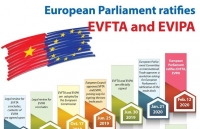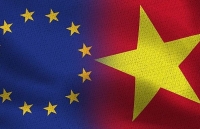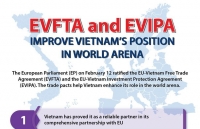
EuroCham: Understanding the market to unlock EVFTA
Latest
| TIN LIÊN QUAN | |
| EVFTA to trigger high-quality FDI flows into Vietnam: AHK | |
| PM hails EP’s approval of EVFTA | |
 |
| President of the European Business Association in Vietnam (EuroCham) Nicolas Audier. |
On February the 12th, the European Parliament (EP) officially ratified the EU - Vietnam Free Trade Agreement (EVFTA) and the Investment Protection Agreement (EVIPA), after nearly 10 years of continuous efforts. How do you evaluate this result?
This is an historic decision, and one which is testament to the hard work of the Government of Vietnam, the EU, and important actors bridging both sides such as the EuroCham.
Ever since negotiations first began in 2012, EuroCham has been a leading advocate for this deal. Our members shared their insights throughout 14 rounds of negotiation and, once the agreement was concluded in 2015, lobbied Members of the EP in Brussels and Vietnam to highlight the social and economic benefits of this deal.
The EVFTA is the most comprehensive and ambitious free trade agreement ever concluded between the EU and a developing nation, and Vietnam is just the second country in Asia to sign a free trade deal with the EU, after Singapore. For the first time, this agreement will give Vietnam privileged access to Europe’s consumer market of around 500 million people, while opening up Vietnam’s fast-growing market to European investors and enterprises.
When EVFTA officially comes into force, this Agreement will remove nearly 99% of tariff lines and trade barriers between Vietnam and the EU. Will there be a greater inflow of investment capital from the EU into Vietnam, especially in the high-tech sector?
Vietnam is a fast-growing market in a strategic part of the world. Over the last few decades, the Government has made continuous reforms to make the trade and investment environment more open, competitive, and business-friendly. So, there is no doubt that the gradual elimination of tariffs and non-tariff barriers, alongside the opening up of service sectors, will increase the flow of investment from the EU to Vietnam.
On top of this, we know that the Government is committed to embracing the digitalisation of all sectors and industries through the 4th Industrial Revolution. Therefore, there will be significant opportunities for European companies to facilitate this drive towards nationwide digitalisation and the high-tech jobs of the future, in particular in sectors such as telecommunications.
How can EU and Vietnamese businesses take full advantages of this agreement?
In order to unlock the full potential of the EVFTA, it is essential for businesses on both sides to understand the markets into which they want to sell their products and services. For example, the EU has high food safety standards. So, Vietnamese companies selling goods like coffee, seafood, nuts and so on should understand the requirements of the European market to make the most of the opportunities available.
Likewise, European enterprises should invest the time to understand the Vietnamese market and build relationships with established partners to take full advantage of this fast-growing consumer market.
The voting result of February the 12th is just the beginning. What are the challenges that Vietnam and the EU have to face in the coming time?
The real challenge now is to ensure a smooth and effective implementation of the EVFTA. Both sides now need to work together to ensure that the benefits agreed to in principle can be realised in practice. In simple terms, this means raising awareness of the EVFTA among the business communities on both sides - working with trusted partners such as EuroCham and our nine national Business Associations - as well as important stakeholders such as the Vietnam Chamber of Commerce and Industry (VCCI).
For this reason, EuroCham will establish a joint Business Council to monitor implementation of the EVFTA in all provinces of Vietnam. The Government should also ensure that there are no gaps in its legislative framework or inconsistencies with the provisions of the EVFTA so that companies and consumers can take full advantage of the agreement the moment it enters into force.
What do you expect about the economic development of both Vietnam and EU when the EVFTA is officially implemented?
European experts have predicted significant economic benefits for Vietnam, once the EVFTA is ratified and enters into force. The increase in trade and investment should see Vietnam’s economy grow by around 8 per cent more than it would have otherwise done without the EVFTA, over the agreement’s decade-long implementation period. In practical terms, this means an increase of around three per cent in the wages of workers, and also an increase in household incomes.
For the European side, there are clear benefits in terms of Vietnam opening up its market and its service sectors. For instance, European goods are currently subject to much higher tariffs when compared to goods from countries with which Vietnam already has a free trade agreement in place. So, once the EVFTA enters into force and tariffs are phased out, European products like pharmaceuticals, automobiles, and high-tech machinery will become more competitive and more successful.
Thank you so much!
 | European Parliament ratifies EVFTA and EVIPA The European Parliament (EP) on February 12 ratified the EU-Vietnam Free Trade Agreement (EVFTA) and the EU-Vietnam Investment Protection Agreement (EVIPA). |
 | Czech, German media spotlight EP’s approval of agreements with Vietnam Media reports in the Czech Republic have highlighted the importance of the EU-Vietnam Free Trade Agreement (EVFTA) for the country and the EU in general ... |
 | EVFTA, EVIPA improve Vietnam’s position in world arena The European Parliament (EP) on February 12 ratified the EU-Vietnam Free Trade Agreement (EVFTA) and the EU-Vietnam Investment Protection Agreement (EVIPA). The trade pacts help ... |

















